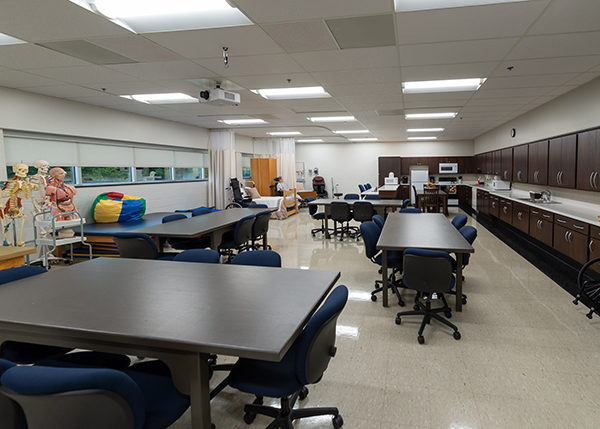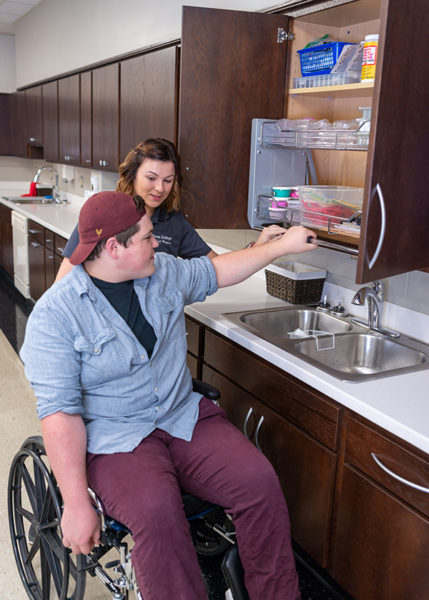A haven for hands-on learning since it first welcomed students more than 30 years ago, the occupational therapy assistant lab at Pennsylvania College of Technology has been updated to provide an even more realistic simulation space for students.
The lab, which provides education to students pursuing associate degrees in occupational therapy assistant, was renovated for the 2018-19 academic year.
 Occupational therapists and occupational therapy assistants help people with physical, developmental and psychosocial challenges learn how to use adaptive techniques and equipment to participate in the daily activities they want and need to do.
Occupational therapists and occupational therapy assistants help people with physical, developmental and psychosocial challenges learn how to use adaptive techniques and equipment to participate in the daily activities they want and need to do.
Services may include evaluating the client’s home and work or school environments, making recommendations for adaptive equipment and training clients to use it, and guiding and educating family members and caregivers.
New features in the Penn College occupational therapy assistant lab include:
 The upgrades are timely as the field of occupational therapy encounters a transition phase, and accreditation standards – set by the Accreditation Council for Occupational Therapy Education – are set to change in 2020.
The upgrades are timely as the field of occupational therapy encounters a transition phase, and accreditation standards – set by the Accreditation Council for Occupational Therapy Education – are set to change in 2020.
“We’re being proactive,” Kerschner said. “We’re positioning ourselves to meet all the demands for where occupational therapy is going in the next 10 years.”
The program has a high standard of its own to meet, as well: For the past five years, 100 percent of the college’s occupational therapy assistant graduates have passed the Certified Occupational Therapy Assistant exam on their first attempt.
The program keeps its classes small.
“We accept 32 students each year,” Kerschner explained. “We recognize the value of one-on-one, hands-on application, providing as much clinical experience as we can.”
For example, each lecture segment includes a clinical competency, plus students complete fieldwork beyond what is required by current accreditation standards.
Kerschner also cites the program’s faculty for its success: Together, the six faculty and staff members who work directly in educating Penn College occupational therapy assistant students have 200 years of experience, and five continue to do clinical work in addition to their work in academia.
“The value is that not only do our instructors have academic experience, but they also remain active in clinic and stay fresh with what students are facing,” Kerschner said.
Occupational therapy assistant students often have opportunities to work with students in other Penn College programs. They work with architectural technology students to examine blueprints and to design adaptations to meet a fictitious patient’s needs, and they participate in the Penn College School of Nursing & Health Sciences Interdisciplinary Professional Event, which gives students from the school’s 10 academic disciplines an opportunity to work together on simulated patient cases.
“That is the joy of Penn College,” Kerschner said. “We have the ability to work with students in other technical majors.”
Penn College offers an associate degree in occupational therapy assistant that can be continued to a bachelor’s degree in applied health studies. The junior- and senior-level courses for the bachelor’s degree are available on campus and online.
For information about Penn College, a national leader in applied technology education, email the Admissions Office or call toll-free 800-367-9222.
The lab, which provides education to students pursuing associate degrees in occupational therapy assistant, was renovated for the 2018-19 academic year.
 Occupational therapists and occupational therapy assistants help people with physical, developmental and psychosocial challenges learn how to use adaptive techniques and equipment to participate in the daily activities they want and need to do.
Occupational therapists and occupational therapy assistants help people with physical, developmental and psychosocial challenges learn how to use adaptive techniques and equipment to participate in the daily activities they want and need to do.Services may include evaluating the client’s home and work or school environments, making recommendations for adaptive equipment and training clients to use it, and guiding and educating family members and caregivers.
New features in the Penn College occupational therapy assistant lab include:
- A kitchen with universal design features, including adapted faucet, a variety of cabinet knobs and pulls, and a Lazy Susan. “We’re trying to give students the idea that these little things are things they need to consider,” explained Jeanne M. Kerschner, director of occupational therapy assistant.
- An outpatient treatment area that includes ADA-accessible cabinets with pull-down shelving and task lighting.
- An acute-care unit with a hospital bed, oxygen, suction and IVs. “It used to be that only those working in hospital settings needed to know how to use this equipment,” Kerschner said. “With changes in the length of stay at hospitals, patients are moving into lower-level care but still have those critical needs. Now everyone needs to be trained – in skilled nursing, outpatient and home-health settings.”
- Specialty wheelchairs that provide more positioning options for patients with specialized seating needs.
- Traditional bedroom and bathroom settings, where students can learn to help patients care for themselves.
- A larger array of therapeutic swings, which are used to assist with sensory processing disorders, range of motion, balance and coordination. “A large portion of pediatric practice uses those swings,” Kerschner said.
- Dimmable lighting and specialized vision glasses, which allow students to prepare for working with clients who have low vision.
- iPads, on which students use apps related to occupational therapy treatment and practice electronic documentation. Clinical sites are increasingly moving away from paper documentation, Kerschner explained.
 The upgrades are timely as the field of occupational therapy encounters a transition phase, and accreditation standards – set by the Accreditation Council for Occupational Therapy Education – are set to change in 2020.
The upgrades are timely as the field of occupational therapy encounters a transition phase, and accreditation standards – set by the Accreditation Council for Occupational Therapy Education – are set to change in 2020.“We’re being proactive,” Kerschner said. “We’re positioning ourselves to meet all the demands for where occupational therapy is going in the next 10 years.”
The program has a high standard of its own to meet, as well: For the past five years, 100 percent of the college’s occupational therapy assistant graduates have passed the Certified Occupational Therapy Assistant exam on their first attempt.
The program keeps its classes small.
“We accept 32 students each year,” Kerschner explained. “We recognize the value of one-on-one, hands-on application, providing as much clinical experience as we can.”
For example, each lecture segment includes a clinical competency, plus students complete fieldwork beyond what is required by current accreditation standards.
Kerschner also cites the program’s faculty for its success: Together, the six faculty and staff members who work directly in educating Penn College occupational therapy assistant students have 200 years of experience, and five continue to do clinical work in addition to their work in academia.
“The value is that not only do our instructors have academic experience, but they also remain active in clinic and stay fresh with what students are facing,” Kerschner said.
Occupational therapy assistant students often have opportunities to work with students in other Penn College programs. They work with architectural technology students to examine blueprints and to design adaptations to meet a fictitious patient’s needs, and they participate in the Penn College School of Nursing & Health Sciences Interdisciplinary Professional Event, which gives students from the school’s 10 academic disciplines an opportunity to work together on simulated patient cases.
“That is the joy of Penn College,” Kerschner said. “We have the ability to work with students in other technical majors.”
Penn College offers an associate degree in occupational therapy assistant that can be continued to a bachelor’s degree in applied health studies. The junior- and senior-level courses for the bachelor’s degree are available on campus and online.
For information about Penn College, a national leader in applied technology education, email the Admissions Office or call toll-free 800-367-9222.
